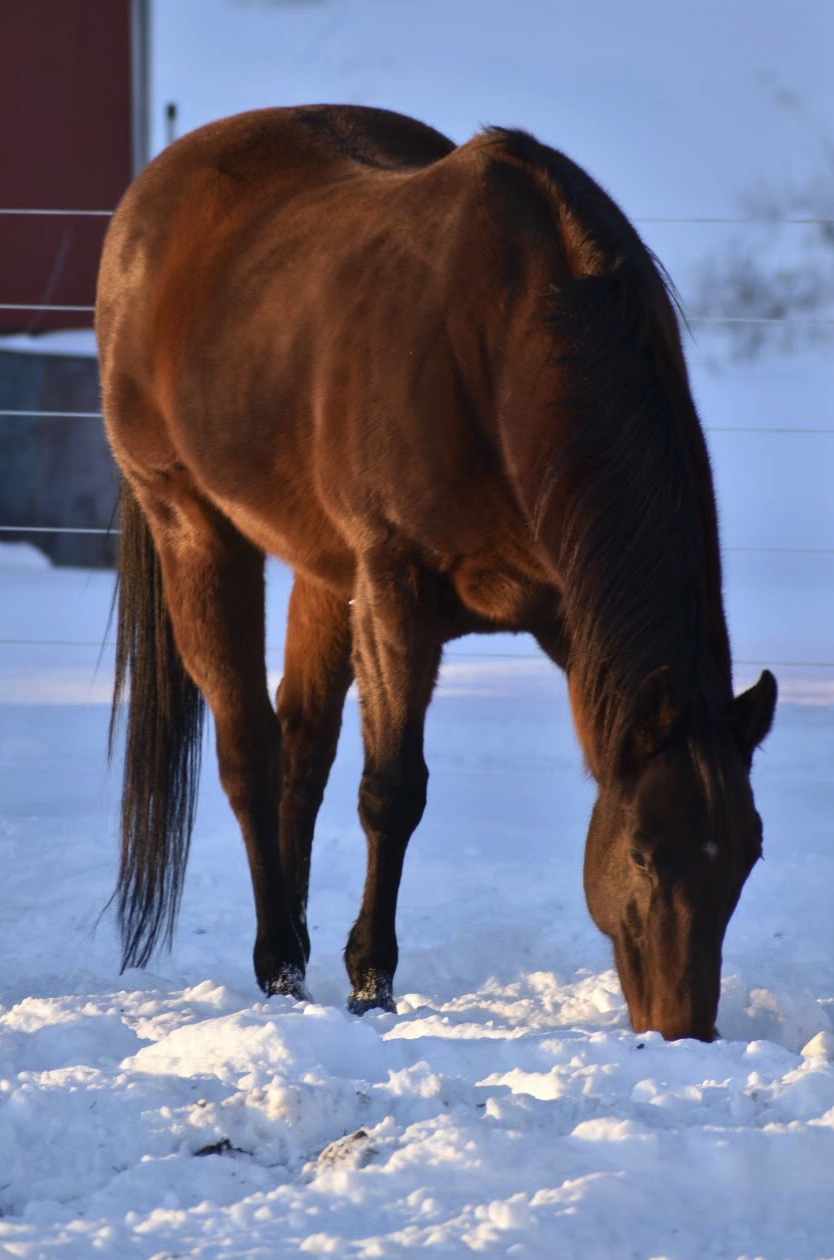Last updated on October 8, 2024
5 Things to Do For Your Horses in Winter to Keep Them Healthy & Happy

Sure, horses in winter need the same basic things they need in milder seasons: quality forage, fresh clean water, and compassionate care from their human. But it’s no secret that severe winter weather can change HOW those things are given to them. Lush green pastures are dead and buried under frost and snow. Water sometimes turns into a block of ice. Long leisurely rides are shortened and the frequency lessened.
In most parts of the country, winter weather is unavoidable. If you have horses, it’s important to ensure they are properly prepared and cared for during frigid temperatures and severe weather. We’ve gathered some great refreshers on keeping your horse as healthy as possible- even in the dead of winter.
How to Give the Best Care to Horses in Winter
Increase Food Intake

- Ideally, your horse should enter winter a little heavier than normal. According to Amy McKlean at the University of Wyoming, a body condition of 6 or 7 is ideal for winter conditions. [1] Monitor their weight gain or loss closely during winter to make sure they’re not losing or gaining too much. Don’t hesitate to adjust feed accordingly.
- As the hindgut digests, it creates energy that keeps the horse warm. Make sure that the hindgut has a consistent supply of fibrous feedstuff to digest! This is important for gut health, and keeps the horse’s inner temperature at a safe level.
- Adding or increasing grain is helpful during winter, but does not produce as much heat during digestion as forage does. To determine how much you should increase your horse’s hay intake, check out this article from the Extension Office at the University of Minnesota.
Keep Them Hydrated
- Because the natural moisture in forage decreases from 60-80% to less than 15% during the winter months, it’s critical to keep your horse hydrated as the temperatures drop. [2]
- Increased food without increasing water intake is a RECIPE for disaster- namely impaction colic.
- Horses can be picky about their water and prefer a temperature between 45-65 degrees in the winter, so investing in a water tank heater may be a good idea.
- Make sure the ice is broken and fresh water is available several times a day if a heater is not feasible.
Give Them a Well-Ventilated Shelter

- Keeping your horses in the pasture during winter is okay, and in some cases ideal, as long as they have shelter from wind and moisture.
- “Horses have an innate ability to withstand cold and wind with no more than a windbreak,” Wes Elford, DVM says in an article on TheHorse.com. [3]
- Horses can tolerate colder temperatures as long as they stay dry and out of the wind.
- If your horses use a barn, make sure it is well-ventilated. Body heat from the horses can create humidity inside the barn which can cause it to become damp and cold. Allowing air to circulate can help keep your barn warm and dry. It can also help prevent upper respiratory infections from ammonia and hay dust. [4]
Horses in Winter Need Supplements Too!
- Even if it’s not competition season for you, your horse could still benefit from high-quality supplements during the winter.
- Foundation Daily Detox and NuTrack Digestive Support will keep their gut healthy and decrease their risk of colic. If your horse struggles with maintaining a healthy weight during the winter, FDD and NuTrack can also help with that! Both products are specifically formulated with ingredients that allow your horse’s digestive system to properly digest and absorb nutrients from their foodstuff.
- Joint supplements like Cissus Quadrangularis and Ultra Pure MSM can help keep older, arthritic horses comfortable and more agile as the winter weather sets in.
Don’t Neglect Hoof Care
- Horses’ hooves grow slower in the winter, but it’s still important to get them trimmed about every 6-12 weeks. [5]
- Regularly clean hooves as snow and ice can compact in the hoof. These “snowballs” can cause poor traction, leading to slips and falls.
Horses in Winter Enjoy it More Than You Do!

Winter isn’t always enjoyable, but following these 5 tips will create an environment that allows your horse to stay healthy and thriving. We humans aren’t exactly built for standing out in the cold and snow, but horses have natural systems in place that allow them to stay comfortable. With a little extra food and water, shelter, consistent hoof care, and some Animal Element supplements your horse will have a great winter! Even if you are miserable while doing chores.
Content is intended for informational purposes only. Proudly written for Animal Element by the team at FaithHanan.com.
Resources:
1. McLean, Amy K., “Prepare Your Horse for Cold Weather.” University of Wyoming, 2009. https://www.uwyo.edu/barnbackyard/_files/documents/resources/domestic-animals/prepare-your-horse-for-cold-weather.pdf
2. Clanton, Chuck and Marcia Hathaway et. al., “Caring for Your Horse in the Winter.” University of Minnesota Extension Office, 2022. https://extension.umn.edu/horse-care-and-management/caring-your-horse-winter#lower-critical-temperature-affects-nutritional-needs-51460
3-4. Loving, Nancy S. “Winterizing Your Horses,” The Horse, December 26, 2021. https://thehorse.com/118527/winterizing-horses/
5. Clanton, Chuck and Marcia Hathaway et. al., “Caring for Your Horse in the Winter.” University of Minnesota Extension Office, 2022. https://extension.umn.edu/horse-care-and-management/caring-your-horse-winter#lower-critical-temperature-affects-nutritional-needs-51460

